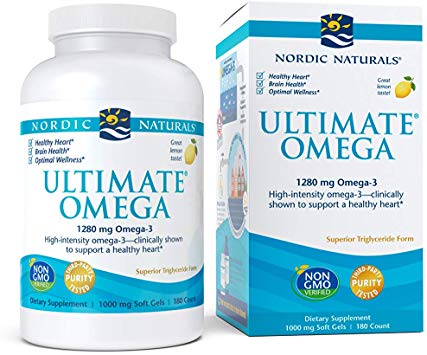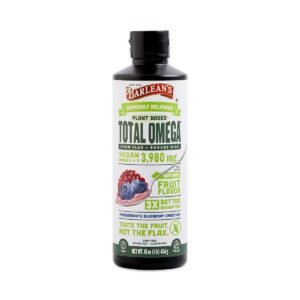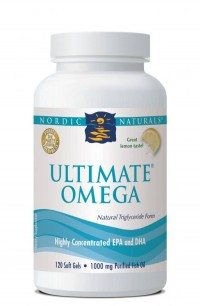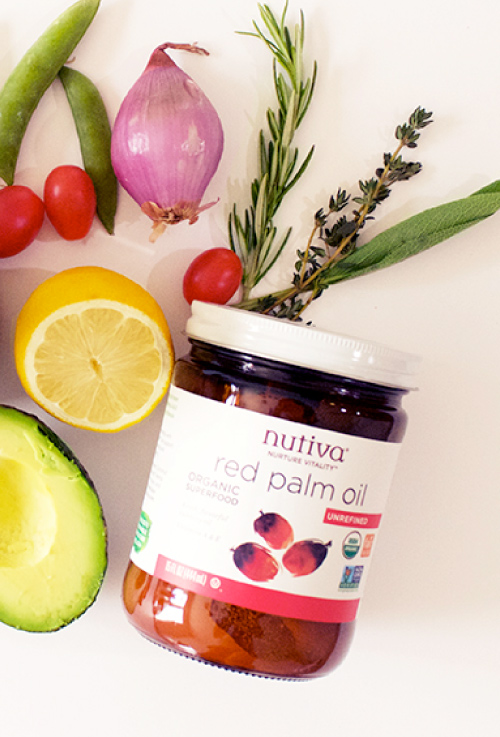There are so many fish oil benefits and we are going to talk about them in this article. Omega-3 fats are particularly beneficial to people suffering from seemingly unrelated conditions that all have inflammation as the common denominator, such as asthma, allergies, arthritis, multiple sclerosis, psoriasis, fibromyalgia, chronic pain, and even coronary artery disease. The omega-3 fats are also widely recognized for their triglyceride-lowering effects.
Considered to be the beauty and brain nutrients, omega-3 fats play a vitally important role in supporting healthy skin, hair, and nails as well as improving cognitive function, attention span, and your ability to process and retain information. They even improve your mood and make you happier!
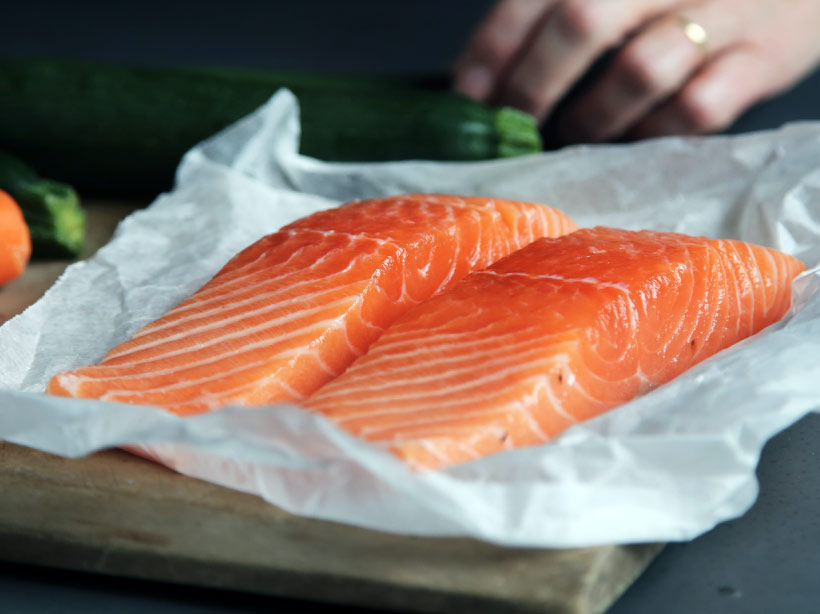
And did you know omega-3 essential fats are slimming fats? One particular type of omega-3 essential fat (EPA) binds to certain receptors in your cells that improve your body’s ability to burn fat while also making your cells more sensitive to insulin. If you want to keep your weight under control, then you want to be insulin sensitive so your body needs to produce only a little bit of insulin at a time; the omega-3 essential fats help your body become more insulin sensitive.
When omega-3 essential fats are missing from your diet, your body is less effective at using insulin and becomes less sensitive to its effects, thus weight loss becomes considerably more challenging. Unfortunately, modern diets are more deficient in the omega-3 essential fats than they are in just about any other nutrient. It’s important to make sure you eat at least one serving of omega-3 rich food each day.
Are Fish Oil Supplements “Clean”?
We realize a lot of people interested in clean eating are concerned about the toxins in fish (and fish oil) these days. As a consumer, it’s important to realize not all fish oils are created equal. Here’s the deal: You get what you pay for. Without a doubt, some fish oils are purer (not to mention fresher and better tasting!) than others. If you buy a high-quality, pharmaceutical-grade fish oil that has been molecularly-distilled and tested for purity by an independent third-party testing organization you can be pretty darn sure you are getting a clean product.
Freshness is a key factor in choosing a high-quality fish oil. The omega-3 fats in fish are extremely delicate and can easily be damaged by improper processing. You want to look for a supplement that does not use oxygen, excessive heat, or chemicals in its processing. A fishy taste is a tip-off that your fish oil supplement isn’t up to snuff in the freshness department. If your fish oil supplement has a fishy taste, you absolutely don’t want to take it.
And keep in mind that a high-quality, fresh fish oil should not leave any nasty fishy aftertaste, nor you should you get that terrible fish burp.
Omega-3 EPA/ DHA Recommendations
Nordic Naturals Ultimate Omega product is a superior-quality pharmaceutical-grade fish oil supplements. Understand that many products contain inadequate amounts of omega-3 fats to really make a difference. You want at a minimum 1000 mg of combined EPA and DHA daily, preferably 2000 mg daily. This almost always means at least 2 and often 4 to 6 pills per day.
Omega-3 Supplements Recommendations for Vegans
If you are a strict vegan, supplement with an algae-based omega-3 supplement. But you’ll need to read labels carefully because many algae supplements contain only DHA and often not nearly in the same quantity as you’ll get from fish oil supplements. You will need to take more algae supplements than fish oil supplements to get the same dosage. Barlean’s Total Omega Vegan Swirl is an incredibly delicious smoothie-like plant-based omega-3 supplement containing DHA from algae sources that you take by the spoonful (no capsules!), and it’s a great product for vegans. This product is good for non-vegans too, and kids love it!
The 3 Omega-3’s
There are three types of omega-3 essential fats, and all three are important: alpha-linolenic acid (ALA), eicosapentaenoic acid (EPA), and docosahexaenoic acid (DHA).
NOTE: ALA is sometimes abbreviated LNA to avoid confusing it with alpha-lipoic acid, an antioxidant that is not an essential fat.
ALA is found in vegan foods, including walnuts and hemp seeds, but two of the most concentrated sources of ALA are flax and chia seeds. If you are drinking your SuperGreen Smoothie every day as part of the Challenge you should be getting ALA in the form of chia seeds. Although eating the whole food in the form of nuts and seeds is the superior choice, you can also get your omega-3 ALA from unrefined, cold-pressed flax oil drizzled on vegetables, salads, grains, and beans. NOTE: It is okay if the food on which the oil is drizzled is warm, but do not cook with flax oil.
EPA and DHA are non-vegan sources of omega-3 fats. The richest sources of EPA and DHA are fatty fish and fish oil supplements. Egg yolks also contain DHA. Although your body can convert vegan ALA to EPA and then EPA to DHA, the conversion process does not happen optimally or reliably. For example, eating too much omega-6 fat (from vegetable oils), saturated fat, and trans-fats can interfere with the conversion process and create an omega-3 deficiency even if you are eating plenty of ALA from vegan foods, such as flax and chia seeds.
So, even though a well-planned plant-rich whole foods vegan diet can contain plenty of ALA from food, we still recommend an EPA and DHA pharmaceutical-grade fish oil supplement for just about everyone because individuals differ in how well their body converts ALA to EPA and DHA and autoimmune conditions, metabolic issues, and numerous lifestyle factors can create a relative DHA deficiency even if the diet is rich in ALA. In our opinions, the greatest weakness of many otherwise very healthful vegan or nearly vegan, plant-strong diets is their lack of optimal amounts of omega-3 fat.
These diets can be somewhat anti-inflammatory due to their very low “bad fat” content, but they are never optimal if they are deficient in EPA and DHA, as most are. Keep in mind the Okinawans are among the longest-living people in the world, and they traditionally consume approximately three servings of fish per week in addition to eating a clean plant-strong diet.
To get optimal amounts of EPA and DHA we suggest you eat 2 or 3 servings (3 to 4 ounces each) of fatty fish every week (the fattier the fish, the better) and also supplement with a high-quality pharmaceutical-grade fish oil supplying at a minimum 1,000 to 2,000 milligrams of combined EPA and DHA daily.
If you have an inflammatory condition such as MS, fibromyalgia, arthritis, or asthma, you could benefit from 1½ to 2 times this amount. If you are a strict vegan you could substitute the fish oil supplement with an algae-based DHA supplement though you will have to take a lot to attain optimal amounts of DHA.
Omega-3 EPA/DHA Fish Oil Facts
Fish oil is the most validated supplement that exists, boasting over 19,000 studies having been conducted thus far. Research links the omega-3 fats in fish oil with improved cholesterol profile and joint mobility; increased bone density; reversal of metabolic syndrome; reduced risk of heart attack, stroke, and congestive heart failure; healthy blood glucose levels and sexual and hormonal function; protection against certain types of cancer, including breast and prostate cancer; and decreased inflammation. In a systematic review published in the Archives of Internal Medicine, fish oil was found to be the most effective prevention for heart disease, and this includes comparing fish oil head to head against all the fancy drugs.(1)
The research validating the tremendous health benefits of fish oil is simply irrefutable.
We thought we’d share some of the other benefits to the omega-3 fats found in fish and fish oil you might not have heard of just yet…
Fish Omega-3 EPA/ DHA as Brain & Mood Food
The central nervous system includes the brain, the omega-3 fats, and in particular DHA, are often called brain food, and for good reason! Did you know your brain is about 60 percent fat by weight and that the fat you eat directly affects the way your brain functions?
Research supports omega-3 fats can dramatically improve your brain and cognitive function by boosting mental clarity, improving quickness of thought, and enhancing your ability to concentrate.
The omega-3 fats from fish oil have also been linked to reducing two of today’s biggest mind–body agers: stress and anxiety. And, if that were not enough promising news to put you in a good mood, you might want to consider trying omega-3s to cheer up.
It’s true, consuming omega-3s is linked with being happier. A tremendous amount of scientific data link low levels of EPA and DHA to a number of mood disorders, including depression, suicide, and learning disabilities. In an article published in the esteemed Archives of General Psychiatry, researchers demonstrated an incredible 50 percent reduction in the standard Hamilton Depression Rating Scale in the majority of the subjects taking an omega-3 fat supplement.(2)
If you take the time to look, you’ll find plenty of well-designed studies showing dietary supplementation with omega-3 fats as being effective and nontoxic therapy for bipolar disorder, postpartum depression, seasonal affective disorder, and attention deficit disorders.
Omega-3 EPA/DHA as a Beauty Booster

Did you know fish oils can even make you more beautiful? This is because omega-3 fats act as a natural lubricant for the skin and work from the inside out to help keep your skin soft and supple. Keep in mind no amount of externally applied high-end skin cream can compete with the natural internal lubricating benefits you’ll get from a healthy diet containing adequate amounts of omega-3 fats.
In fact, some of the symptoms of omega-3 fat deficiency include dry, itchy skin and brittle hair and nails. And if you battle with breakouts and acne you should notice improvement with these problems too once you start getting more omega-3s.(4)
Omega-3 EPA/DHA as a Skin-Saving Sun Blocker
Omega-3s are also among the proven substances to reduce sun damage and provide protection from sunburn. Other protective substances are flavonoids, carotenoids, tocopherols, and tocotrienols. All of these substances have been proven to be orally bioavailable for the purpose of protecting your skin from the sun, meaning you can take them by mouth and levels will rise in your skin, where they do their work.
Of these substances, the omega-3s seem to have the most research behind them; human studies show an approximate 35 percent increase in the amount of time it takes sunlight to redden the skin. While it is possible to get this protection from foods such as walnuts, flax, fish, and shrimp, omega-3 fatty acids should probably be supplemented because best results occur at doses as high as 4 grams daily.
EPA alone or EPA and DHA together are effective. There is strong but not yet conclusive evidence that omega-3 fats can prevent skin cancer too. The bottom line is your skin just won’t look as good, won’t be as healthy, and won’t stay as youthful as it otherwise could if you don’t get enough omega-3 fish oils.
Omega-3 EPA/DHA as Fat Fighter
Just when you thought the fish fat benefits couldn’t get any “phatter” there’s more; eating more fish fats can potentially help you burn more body fat. Yup! It’s true, folks. Fish fats help fight body fat for several overlapping and intertwined reasons. First of all, the latest obesity research recognizes inflammation is a primary offender leading to weight gain and that eating pro-inflammatory foods like trans-fats, butter, and sugar can make you gain weight.
In our book, Clean Cuisine, we explain the intimate relationship between body fat and inflammation and how extra body fat increases inflammation and can potentially make you fatter still. The opposite is also true; anti-inflammatory foods—including omega-3 fish fats—can decrease inflammation and help you lose weight. Omega-3 fish fats also improve your body’s sensitivity to insulin, thus creating a favorable fat-burning environment. (5)
In addition, omega-3 fish fats are thought to bind to special receptors in your cells called peroxisome proliferator-activated receptors (PPARs) that actually turn on genes that cause your body to burn fat.(6) The omega-3 fats are also required for the production of thyroid hormones, and thyroid hormones stimulate your mitochondria to burn more fat for energy.
All of this doesn’t mean that simply downing some fish oil pills along with your morning doughnut is going to be the cure to your weight-loss worries. Instead, taking fish oil supplements provides a safe weight-loss booster along with plenty of additional healthy fringe benefits. You have nothing to lose by adding fish oils to your diet… except for a few unwanted pounds!
Omega-3 EPA/DHA to Slow the Aging Process
Researchers from Ohio State University published incredible anti-aging results associated with EPA and DHA supplements in the journal, Brain, Behavior and Immunity. The study team found that most healthy, middle-aged and older adults who took omega-3 supplements for four months altered the ratio of their fatty acid consumption in a way that helped slow telomere shortening.
Many consider telomere shortening to be a normal part of the aging process and it is known that telomeres naturally shorten over time as a consequence of poor diet, stress, environmental and household pollutants. Scientists know that telomeres shorten faster as a result of increased oxidative stress, a process induced by consuming foods laden in trans or hydrogenated fats and sugars and by chronic disease. This research is important because it supports the notion that telomere shortening can be prevented and even reversed by lifestyle improvements including supplementing with EPA and DHA.
Our Omega-3 EPA/ DHA Supplement Recommendations
We recommend you supplement with at least 2,000 milligrams of combined EPA and DHA daily. If you have an inflammatory condition such as multiple sclerosis, asthma, or fibromyalgia, you should take 3,000 milligrams daily. Look for a pharmaceutical-grade fish oil that undergoes molecular distillation, ultra-filtration, and purity testing by an independent third-party testing organization. Freshness is a key factor in choosing a high-quality fish oil. Keep in mind, the omega-3 fats in fish can oxidize easily if not handled properly, and oxidized oils can potentially be very harmful. Any fishy taste is a tip-off that your fish oil supplement isn’t up to snuff in the freshness department. If your fish oil supplement has a fishy taste you absolutely don’t want to take it.
References:
- M. Studer, M. Briel, B. Leimenstoll, et al., “Effect of Different Antilipidemic Agents and Diets on Mortality: A Systematic Review,” Archives of Internal Medicine 165, no. 7 (2005): 725–30.
- M. Peet and D. F. Horrobin, “A Dose-Ranging Study of the Effects of Ethyl- Eicosapentaenoate in Patients with Ongoing Depression Despite Apparently Adequate Treatment with Standard Drugs,” Archives of General Psychiatry 59, no. 10 (2002): 913–19.
- M. M. McCusker and J. M. Grant-Kels, “Healing Fats of the Skin: The Structural and Immunologic Roles of the Omega-6 and Omega-3 Fatty Acids,” Clinical Dermatology 28, no. 4 (2010): 440–51.
- P. D. Tsitouras, F. Gucciardo, A. D. Salbe, et al., “High Omega-3 Fat Intake Improves Insulin Sensitivity and Reduces CRP and IL6, but Does Not Affect Other Endocrine Axes in Healthy Older Adults,” Hormone and Metabolic Research 40, no. 3 (2008): 199–205.
- O. A. Gani, “Are Fish Oil Omega-3 Long-Chain Fatty Acids and Their Derivatives Peroxisome Proliferator-Activated Receptor Agonists?,” Cardiovascular Diabetology 7 (2008): 6.
